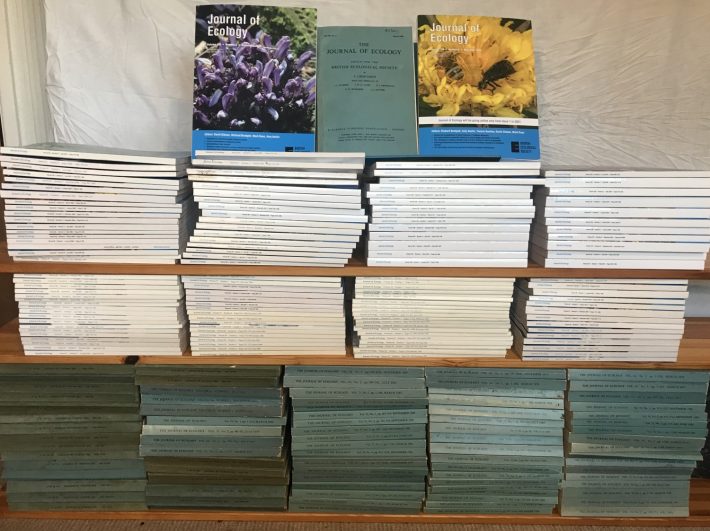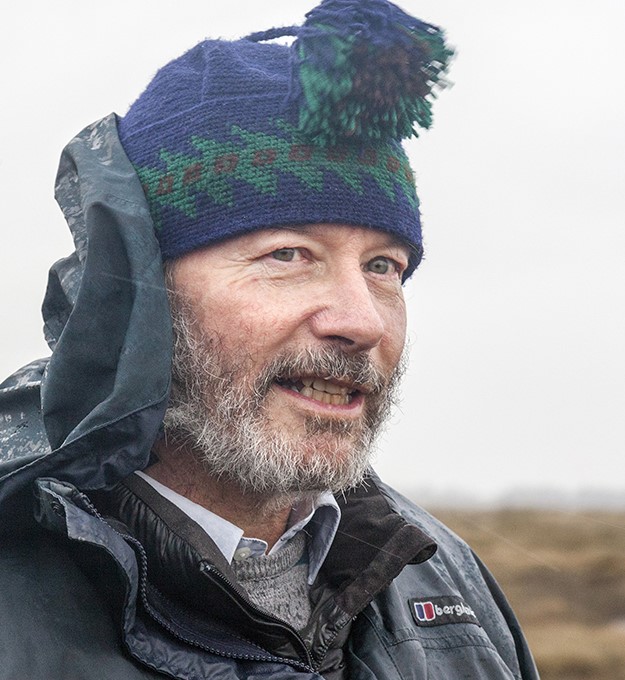The end of 108 years of print
The BES has printed its last journal issue. This year the Journal of Ecology finally joined the rest of the Society’s stable of seven journals as online-only, causing Tony Davy to look back.

Many members may not remember the days when print was the only option, although this was the case for most of our senior journal’s distinguished history since it was founded in 1913.
My own collection of print issues started in 1966. I am sure that there are people out there with longer runs but it’s not a bad effort! I joined the British Ecological Society as a first-year undergraduate. Getting cheap, personal access to the (then) three issues a year was admittedly a motivating factor for joining.
In those days the Society only had one other offering, the Journal of Animal Ecology. Then the Journal of Applied Ecology started up and so I subscribed, pleased with myself to be ‘in’ on the enterprise from near the beginning.
My own collection of print issues started in 1966
All this of course was before print itself went digital, let alone online. The arcane world of lead type, etched copper plates and galley proofs seemed exciting, even glamourous, to a new boy. Does anyone get as excited about correcting their first pdf proof online? Perhaps so – I’m probably just jaded!
It was also a much slower world. I discovered not many years later that publishing in BES journals was a process measured in years rather than months. Over the following years the volume of material published increased dramatically and by the time I retired, I had accumulated a crushing weight of paper that occupied many metres of shelf space.
Print v online
So, what are the pros and cons of progress? It is now hard to imagine working without the searchability and instant gratification of online resources. Furthermore, electronic working has ushered in an era of streamlined, rapid publication; who could have predicted the liberation of unlimited use of colour, and at no premium?

The tedium and cost of having to photocopy articles of interest has disappeared, as have the innumerable box-files needed to store the products. Given the apparently exponential increase in publishing, it has become harder and harder to justify the carbon footprint of printing and distributing journals worldwide, not mention the cost.
On the other hand, I do confess to nostalgia for the convenience and pleasure of browsing clearly printed pages. I still even retain a few of the wretched box-files. A stroll to the calm of the library was always a good excuse to get out of the office.
Even with advances in screen technology, if you want to compare pages in different publications, clarity and accessibility anywhere near that of print is expensive – and big or multiple screens are not exactly portable. Does anybody else remember being able to read articles in bright sunshine in the garden?
Lofty intentions
Moreover, recent lockdowns have highlighted the potential limitations of internet bandwidth; I now appreciate how fortunate I was (in a rural setting) to have been upgraded recently to fibre broadband.
It is infinitely easier to call up a paper in a few clicks than rummage in the loft
You might think, then, that I am loyal to my 55 printed volumes of the Journal of Ecology. Not exactly, I am afraid: it is infinitely easier to call up a paper in a few clicks than rummage in the loft, where I have now perforce had to cache much of my run. Perish the thought but I have even been considering recycling the whole lot.
At last, it’s probably time for decluttering and it would spare the loading on my joists. These days you can’t even give away what was once considered a valuable asset. Alas for print.
Anthony (Tony) Davy is Emeritus Professor of Ecology at the University of East Anglia. He is a former Honorary Meetings Secretary of the Society, and has been Associate, Senior and Executive Editor of the Journal of Ecology; since 2005 he has edited its Biological Flora series. Photo credit: Julia Cameron
Like what we stand for?
Support our mission and help develop the next generation of ecologists by donating to the British Ecological Society.